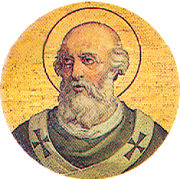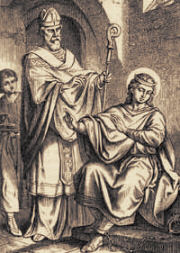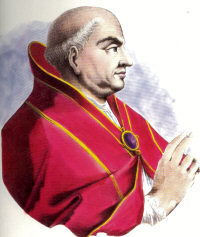Easter: April 13th
Saturday of the Second Week of Easter; Optional Memorial of St. Martin I, Pope and Martyr
Other Commemorations: St. Hermenegild, Martyr (RM)
» Enjoy our Liturgical Seasons series of e-books!
Today is the Optional Memorial of St. Martin I (d. 655), who was pope from 649 to 654. He was a courageous defender of the faith against heresy. He held a council at Rome which condemned the Monothelite heresy which taught that Christ had no human but only a divine will and defended that Christ was true God and true man. The heretical Byzantine emperor, Constans II, had him treacherously arrested and taken to Constantinople. After many sufferings and humiliations, he was exiled to Cherson in the Crimea where he died of exhaustion, broken by his sufferings, in 654.
Meditation for Saturday of the Second Week of Easter
The Spirit of Faith
1. "Except I shall see in His hands the print of the nails, and put my finger into the place of the nails, and put my hand into His side, I will not believe." Thomas must see to believe. The Lord deals with this weakness in His disciple with a condescension that is striking. Nevertheless He does not fail to admonish him, "Because thou hast seen Me, Thomas, thou hast believed; blessed are they that have not seen and have believed" (Gospel).
2. Thomas is the representative of that vast throng of men who refuse to accept the testimony of the gospel or of the Church. They accept nothing but that which they can see with their own eyes and touch with their own hands. Thomas is also typical of all those who, though they accept the testimony of the gospel and of the Church, yet in practical life never rise above a purely natural level in their thinking and in their outlook on life. They recite the Creed with the Church, but they lack the spirit of faith. Many Christians and many Catholics have such an attitude. They reason, judge, speak, and act in exactly the same manner as the world about them thinks and acts. Practically speaking, they have no higher ideal than any other man of the world. They are satisfied with health, prosperity, a livelihood, an interesting occupation, and amusing pastimes. When they encounter anything unpleasant or when they suffer hardships, they look about for a scapegoat, disclaiming all personal responsibility, and exhaust all the means at hand to escape from that which is hard or unpleasant. There is nothing supernatural in their point of view or in their manner of acting.
The majority of Christians and of Catholics who subscribe fervently to the creed of the Church, allow themselves to be governed by worldly considerations, by the opinion of their superiors, or by the claims of their worldly occupations, or the needs of their human career. Their actions are governed by human respect; they are swayed by any emotion; and they are covered with a mantle of self-love and pride. Even those consecrated to God and living behind the walls of the cloister are often ruled by purely natural motives far more than they themselves suspect. More than they are aware of it, their actions are governed by self-love in its manifold forms, rather than by motives of faith and the love of God. They live lives that are far from being supernatural. They do not live, as they should, by faith, with their gaze fixed on Christ, on God, and on His holy will. For this reason they experience so much unrest, so much uncertainty, such instability, weakness, and emptiness in their spiritual life. "Blessed are they that have not seen and have believed."
"Know also this, that in the last days shall come dangerous times. Men shall be lovers of themselves, covetous, haughty, proud, blasphemers, disobedient to parents, ungrateful, wicked, without affection, without peace, slanderers, incontinent, unmerciful, without kindness, traitors, stubborn, puffed up, and lovers of pleasure more than of God; having an appearance indeed of godliness, but denying the power thereof" (II Tim 3:1-5). We are tempted to believe that the evil times described here by St. Paul have already arrived. Even in the very strongholds of piety, many pious and spiritual persons have become worldly and exert themselves only in the search for pleasure. They measure life in terms of the senses. Theirs is a piety which is little more than a continuous interplay of sensations and emotions. Such piety naturally shrinks from difficulties, exertions, and self-sacrifice. It occupies itself with spiritual things, even with prayer and the sacraments, only as a means of satisfying its emotional needs. The soul is thus deprived of the benefits it should reap from these exercises. The reward of such effort is merely a desolate spiritual dryness and an enduring emptiness "One encounters scarcely a single person," says St.John of the Cross, "who escapes this tyranny of the senses."
Such souls barely scratch the surface of life; superficiality rules their life of prayer, their work, and their fulfillment of the duties of their state of life. They cannot rise to God, for they are bound to earth by fetters of superficiality. They can never look into the depths, because their attention is always distracted by trivialities. They are warped and become such slaves of minor details that their condition is often ridiculous. They are cast about from side to side, and become continually weaker. They multiply their prayers, increase their efforts and their spiritual exercises; but all this serves merely to dissipate their strength and squander their energy. They have "an appearance indeed of godliness, but deny the power thereof." Such miserable, unfruitful souls have built their spiritual edifice on feelings and emotions rather than on the spirit and the firm foundation of faith. Since they live without having fixed their gaze on God and His love, since they neglect His providence and His will, there is no depth to their piety, no strength or security or stability in their souls. "Blessed are they that have not seen and have believed."
"This is the victory which overcometh the world, our faith" (Epistle). The spirit of faith makes us consider everything we encounter in the light of God and His divine providence. It makes us accept everything as coming from His eternal solicitude and by His divine appointment. Faith gives us enlightenment, solidity, understanding, and peace. "Blessed are they that . . . have believed."
That new life which we received at Easter (that is, when we were baptized), we should strive to increase daily through the celebration of Mass and the devout reception of Holy Communion. We may enrich our spiritual life further by holy reading and the practice of other spiritual exercises. Even when we have done these things, we shall yet remain far from our goal, which is to live entirely by faith. Only when we have reached that goal will we be able to truly celebrate "the paschal solemnity" (Collect).
—Benedict Baur, OSB, The Light of the World, Vol. 2.
St. Martin I
 The unfortunate victim of Constans' wrath was the virtuous Martin. Born in Todi of noble birth, he had served as nuncio to Constantinople under Pope Theodore, gaining experience in dealing with the Byzantine court and familiarizing himself with the Monothelite teachings so prevalent in the East. Without waiting for the necessary imperial mandate, Martin proceeded with his consecration on July 5, 649. This independent act so enraged the emperor that he refused to acknowledge Martin as the legitimate pope.
The unfortunate victim of Constans' wrath was the virtuous Martin. Born in Todi of noble birth, he had served as nuncio to Constantinople under Pope Theodore, gaining experience in dealing with the Byzantine court and familiarizing himself with the Monothelite teachings so prevalent in the East. Without waiting for the necessary imperial mandate, Martin proceeded with his consecration on July 5, 649. This independent act so enraged the emperor that he refused to acknowledge Martin as the legitimate pope.
A staunch defender of the orthodox, Martin immediately convened a synod in the Lateran. Attended by 105 Western bishops, the synod studied all aspects of Monothelitism and the emperor's Type. After nearly a month, the synod reached a conclusion. They determined that there were two wills in Christ, condemned the One Will heresy, and further condemned Constans' Type for boldly prohibiting the truthful teachings of the apostles. In an effort to pacify the emperor, Martin acknowledged Constans' good intentions in trying to unify the Church and placed the burden of responsibility on the poor advice of Constantinople's patriarchs.
Constans, far from appeased, was determined that his religious policies would not be ignored. Appointing his chamberlain Olympius as exarch to Italy, he dispatched him with the order to obtain the signatures of acceptance from all Italians without exception. Olympius proved to be a dismal failure, both in his mission and in an attempted assassination of the popular pope. The exarch prudently abandoned his post and fled to Sicily to fight the invading Muslims.
In the summer of 653, the furious emperor appointed yet another exarch, Theodore Calliopas, with orders to escort the inflexible pontiff to Constantinople. Calliopas and his officers boldly entered the Lateran, arrested the bedridden Martin, and presented the clergy with Constans' edict deposing the pope who had been consecrated illegally. The voyage, which took nearly three months, subjected the sickly pope to humiliation and abuse. Arriving in Constantinople, racked with dysentery and disabled by gout, Martin was placed in solitary confinement. On December 19, 653, Martin was brought to trial on trumped-up charges of treason and sacrilege. The pope, near death and realizing his position futile, could only laugh at the ridiculous accusations and beg the emperor to excuse the fumbling witnesses before they added perjury to false witness! Constans pronounced the predetermined verdict of guilty on the pontiff and sentenced him to public flogging and death. The disapproving crowd watched, horrified; and it was only by the dying Patriarch Paul's intercession that Martin's sentence of public execution was commuted to banishment.
For nearly three months, the pope suffered under the worst conditions in a Byzantine prison before he was exiled to the Crimea. There, on September 16, 655, suffering from cold and starvation, Pope Martin gratefully met his God. Pious Martin had been disgraced in life but later became honored as a martyr. Today he is venerated as a saint; his feast is celebrated by both the Roman and Greek Churches on April 13. He is the last pope recognized as a martyr.
—The Popes: A Papal History, J.V. Bartlett
Symbols and Representation: Pope holding money; Pope with geese around him (possible confusion by artist with Martin of Tours); Pope in a prison cell.
Highlights and Things to Do:
- Read more about Pope St. Martin I:
- See Pope St. Martin's statue on St. Peter's Basilica Colonnade.
- As head of the Church, St. Martin condemned false doctrine and thereby brought upon himself the wrath of the Emperor. He would not yield a hairbreadth from the way of truth, even when such a stand entailed suffering, imprisonment, exile, death. Here is a model for fidelity to one's vocation. In every state of life there are opportunities for martyrdom. Spend some time considering your own life and examine whether or not you take the opportunities presented to witness to the truth.
- Pope Martin, fearing that the truth about Christ would not be taught, called a council at the Lateran. Learn more about monothelitism and monothelites.
St. Hermenegild
 Leovigild, Arian King of the Visigoths, had two sons, Hermenegild and Recared, who were reigning conjointly with him. All were Arians, but Hermenegild married a zealous Catholic, the daughter of Sigebert, King of France, and by her holy example was converted to the faith. His father, on hearing the news, denounced him as a traitor, and marched to seize his person. Hermenegild tried to rally the Catholics of Spain in his defense, but they were too weak to make any stand; and after a two years’ fruitless struggle, Hermenegild surrendered on the assurance of a free pardon. Once he was safely in the royal camp, the king had him loaded with fetters and cast into a foul dungeon at Seville.
Leovigild, Arian King of the Visigoths, had two sons, Hermenegild and Recared, who were reigning conjointly with him. All were Arians, but Hermenegild married a zealous Catholic, the daughter of Sigebert, King of France, and by her holy example was converted to the faith. His father, on hearing the news, denounced him as a traitor, and marched to seize his person. Hermenegild tried to rally the Catholics of Spain in his defense, but they were too weak to make any stand; and after a two years’ fruitless struggle, Hermenegild surrendered on the assurance of a free pardon. Once he was safely in the royal camp, the king had him loaded with fetters and cast into a foul dungeon at Seville.
Tortures and bribes were in turn employed to shake his faith, but Hermenegild wrote to his father that he regarded the crown as nothing, and preferred to lose scepter and life rather than betray the truth of God. At length, on Easter night, an Arian bishop entered his cell, and promised him his father’s pardon if he would receive Communion from his hands. Hermenegild indignantly rejected the offer, and knelt with joy for his death-stroke, praying for his persecutors. The same night a light streaming from his cell told the Christians keeping vigil nearby that the martyr had won his crown and was celebrating the Resurrection of the Lord with the Saints in glory.
King Leovigild, on his death-bed, was changed interiorly. He had been witness to the miracles that had occurred after his son’s cruel death, and he told his son and successor Recared to seek out Saint Leander, whom he himself had persecuted. Recared should follow Hermenegild’s example, said the king, and be received by the bishop into the Church. Recared did so; and although his father himself had not had the courage to renounce the false faith publicly, after his father’s death the new king labored so earnestly for the extirpation of Arianism that he brought over the whole nation of the Visigoths to the Church. “Nor is it to be wondered,” says Saint Gregory, “that he came thus to be a preacher of the true faith, since he was the brother of a martyr, whose merits helped him to bring so many into the haven of God’s Church.”
—Little Pictorial Lives of the Saints
Patronage: against drought; against flood; against thunderstorms; converts; Spanish monarchy; Seville, Spain
Symbols and Representation: axe; young prince in armor being borne to heaven while contemplating the crucifix while around him angels carry an axe; chains; royal regalia; a palm; and a rose wreath and heretical bishops and king stand below him; prince with an axe.
Highlights and Things to Do:
- Read more about St. Hermengild:
- Learn more about Spain under the Visigoths.
- See some iconography of St. Hermengild at Christian Iconography.






